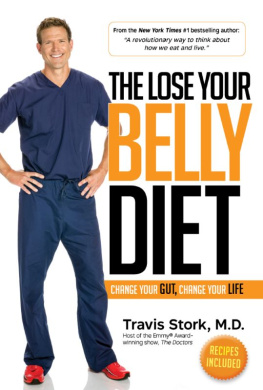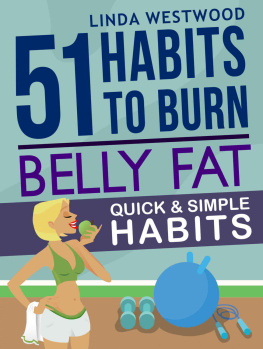Table of Contents
Belly Fat Effect
The Real Secret About How
Your Diet, Intestinal Health,
And Gut Bacteria Help
You Burn Fat
by Mike Mutzel, MS ( c )
Wilsonville Media
Oregon
Belly Fat Effect
Copyright 2014 by Mike Mutzel, MS ( c ) . All rights reserved.
Printed and electronically distributed in the United States of America. Except as permitted under the United States Copyright Act of 1976, no part of this publication may be reproduced, scanned or distributed in any form or by any means, or stored electronically for later retrieval, without the written permission of the author. For permissions or discounts for group sales, please contact the publisher.
Limit of Liability/Disclaimer of Warranty: While the publisher and author have used their best efforts in preparing this book, they make no representations or warranties with respect to the accuracy or completeness of the contents of this book and specifically disclaim any implied warranties or merchantability or fitness for particular purposes. No warranty may be created or extended by sales representatives, written sales, or promotional materials. The advice and strategies presented herein may not be suitable for your situation. This book is sold with the understanding that the publisher is not engaged in rendering medical, legal, accounting, or other professional services. You should consult with a professional where appropriate. Neither the publisher nor the author shall be liable for any loss of profit or any other commercial damages including but not limited to special, incidental, consequential, or other damages.
ISBN: 978-0-9910703-2-9
Published by:
Wilsonville Media:
info@wilsonvillemedia.com
www.wilsonvillemedia.com
Connect with the author:
MikeMutzel.com
twitter.com/MikeMutzel
facebook.com/MikeMutzelMS
Foreword - By David Perlmutter, MD
If you were to ask people why they want to lose weight, most commonly you would hear that they just want to look better. But excess weight, especially the type of fat that accumulates in the belly, represents a far more sinister event in human physiology than simply a cosmetic change. While body fat does indeed represent a depot of calories, it has now been shown to be a far more active player in human health than we ever imagined. Body fat itself regulates metabolism, hunger, and brain activity and even enhances the production of chemical mediators of inflammation. This likely explains why excess poundage directly relates to increasing a persons chances for just about every medical problem they dont want to have, including heart disease, cancer, diabetes, Alzheimers disease, arthritis, and osteoporosis.
Ours is a country where being overfed while being undernourished has become the norm. Hardly a week goes by without a new diet being popularized in the media as a surefire way to drop excess pounds. And what remains a common themenot only in the countless diet books that flood bookstores but also in the many commercial weight-loss institutionsis the notion that if we can just cut the fat and reduce our calories, we will be rewarded by aggressive and long-lasting weight loss.
But this approach to weight loss is flawed on two counts: First, this mentality is not in any way consistent with current leading-edge research. Second, the recommendation to eat low fat leads to an increased consumption of carbohydrates and a diet completely unlike what humans have ever consumed for more than 99% of the time we have existed on this planet.
In Belly Fat Effect , Mike Mutzel deftly presents the science that reveals how and why body fat is created and stored. He explores the fundamentals of the role of the hormone insulin in this process. Insulin signaling, by stimulating the production of life-sustaining fat, has been responsible for human survival for hundreds of thousands of years. Were it not for this adaptation, our species would have perished during times of food scarcity. The painful irony is that this very same hormonal pathway plays the leading role in the global epidemic of obesity during the current times of caloric abundance.
In the pages that follow, Mike presents the fundamentals of the compelling science related to fatits genesis and storage. More importantly, you will be empowered by the actionable, user-friendly information that is based on this science to make substantial changes in your lifestyle choices. And these changes will pave the way for you to redirect your health destiny and ensure a longer and healthier life.
Introduction - A New Look at a Growing Problem
This book is going to change the way you look at your metabolism. Every aspect of storing, utilizing, and burning fat, protein, and sugar will be examined from the vantage point of metabolism, a perspective that has been largely unrecognized until recently. The origins of obesity-related problems are metabolic in nature and stem from imbalances in our intestinal bacteria which in turn lead to an overactive immune system. These bacteria are highly malleable. Diets rich in fiber and colored fruits and vegetables foster a microbial milieu that favors fat burning. 2,3 In contrast, poor food choices initiate a cascade of events that lead to inflammation and disturbances in blood sugar and fat metabolism, precursors to obesity, insulin resistance, cardiovascular disease, and diabetes. 4,5,6
The millions of bacteria residing in our intestines lie at the interface between two integrated bodily systemsthe metabolic and the immunethat simultaneously go awry as the pounds accumulate. 7,8 You can think of the relationship between these two seemingly detached yet highly amalgamated systems as being like our governments economic and defense systems. When the bad guys threaten us, our country spends more money to bolster its defenses. If your diet leads to a proliferation of bad-guy bacteria, your body must reallocate cellular energy to combat the harmful organisms.
This defense mechanism comes at a hefty price. Immune cells congregate in areas of the body that are vital to metabolism, such as the liver and fat tissue, where they pivot metabolism away from fat burning in favor of sugar burning. 10,11,12 The result is low-grade inflammation and insulin resistance, leading to obesity and eventually chronic disease. Keep this national defense analogy in mind while I share with you why Ive dedicated years of my life to researching and writing this book.
THE FAT PROBLEM
The obesity epidemic is hard to ignore. The media regularly features stories about some aspect of our national weight-control problem and the American Medical Association recently classified obesity as a disease. More than 35 percent of American adults and nearly 17 percent of children are obese and, therefore, at greater risk of heart disease and type 2 diabetes. 14,15 Obesity is having a body mass index (BMI) of 30 or higher. One is considered overweight when their BMI is between 25 and 30. About 68 percent of Americans aged twenty and older fall into either the overweight or obese camp because they weigh more than is ideal for optimal health.
Not only do those extra pounds impact health, but they can also lead to boundless labeling and stereotyping. Obesity creates an environment where physical disease and emotional difficulties flourish.
Admittedly, I was in this camp of discriminators. Prior to working one-on-one with overweight people, many of whom also had diabetes, my view of obesity was ignorant and inaccurate. Overweight people are lazy and unmotivated, I thought. As a fully recovered victim of the freshman fifteen, Id ruminate with friends and family over our personal body-weight woes. The conversations always culminated with the same solution: put down the fork and go to the gym.











